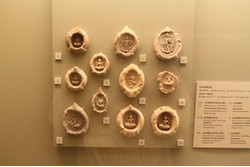Artwork Search
Arts in Southeast Asia Database
Buddha Amulets
Keywords : Buddha Amulet, Bangkok National Museum
| Artwork alternative name | Clay Buddha Amulets |
|---|---|
| Site common name | National Museum of Phra Nakhon |
| Type of artwork | Sculpture |
| Sub district | Phra Borom Maha Ratchawang |
| District | Khet Phra Nakhon |
| Province | Bangkok |
| Region | Central |
| Country | Thailand |
| Geographic Coordinates Decimal degree | Lat : 13.7576 Long : 100.492222 |
| Geographic Coordinates UTM | Zone : 47 P Hemisphere : N E : 661329.97 N : 1521418.09 |
| Place of artwork | It is exhibited in the exhibition room of the National Museum of Phra nakhon. |
| History of production | No written evidence of creation history was found. However, the art forms of the sculpture suggests its influences from Indian’s Pala Art and Central Java’s Art of Indonesia, both from 14th-15th Buddhist Century. Therefore, it is estimated that the amulets are of the same period. |
|---|---|
| Production process | The raw clay imprinted with Bodhisattva images or other holy figures in Buddhism. After that, created mold and imprint the Buddha or Bodhisattva images on the clay. Then leave the amulets outside to dry off. |
| Art | These amulets were found in many area of Southern Thailand. These amulets are rounded. The upper part is slightly pointed. Some pieces are made with the bottom pointed with Bodhisattva or other holy figure images imprinted in the middle. For example, The 21-arm and 4-arm Avalokitesvara, or Kubera, Lord of Wealth and the god-king of the semi-divine Yakshas. These amulets are found in the territories of Mahayana Buddhist Kingdoms such as Pala Dynasty of India and Shailendra Dynasty of Java which made them the evidence of the relationship between the Mahayana Buddhist Kingdoms Network. |
| Key academic information | These Clay Amulets reflect the belief in Mahayana Buddhism and the relationship of Southern Thailand with other regions that also follow Mahayana Sect such as Pala Dynasty of India and Shailendra Dynasty of Java. |
| Notice | The votive tablet often includes the bone or ash in it. The Motive Tablets or Buddha Amulets are often found in the caves that were transformed to be Buddhist Monasteries or Holy Places. |
| Period | Historical Period |
| Art period | Srivijaya |
| Age | 13th-15th Buddhist Century |
| Religion | Buddhism |
| Sect | Mahayana |
| Religion and belief | Mahayana Buddhism |
| Type of License | Attribution-NonCommercial-NoDerivs (CC BY-NC-ND) |
|---|---|
| Rights | Princess Maha Chakri Sirindhorn Anthropology Centre |
| Date of record creation | 2016-10-13 |
| Record creator | Rungroj Thamrungraeng |
| Bibliography | Piriya Krairuek. Southern Art before 19th Buddhist Century. Bangkok : Fine Arts Department, 1980. Surasawat Suksawat, M.L. “The Study of The Votive Tablets of Southern Thailand” (Dissertation of Master of Arts in Historical Archaeology, Graduate College, Silpakorn University), 1985. |


